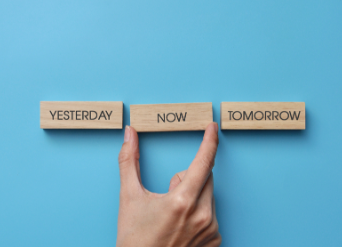by Dolores Greenawalt, PhD

There are so many different things a faculty member can do to be productive in the new year. Sometimes, it's nice to have a reminder of what we could do to reset ourselves. Working in higher education gives us the unique ability to witness a constant rebirth and change what we didn't like in the past.
Creating an environment to do such a thing can be difficult, especially if we are drained, uninspired, or unhappy with our current situation. Regardless of how we feel, one thing we can do is put the distractions away (I'm talking to those of you on TikTok while reading this). Let's consider a few ways we can be more productive.
1. Close your browsers.
Do you really need 27 browsers open? If you're like me and the answer is yes, then open a new window where it's dedicated to work. It will, at the very least, put the other ones on the back burner.
2. Put aside everything you don't need to do, and focus on what you need to accomplish.
Easier said than done, right? One helpful thing you can do is put away your phone. The times we live in have created an existential thought process, making us believe we are more important than we really are. Everyone will survive if we wait 60 minutes to get back to them.
3. Use your work hours for undistracted work.
Planning your day can truly make a difference. We plan our dinner time. We plan when we will go to the gym. We plan our weekends. Planning the time you're at work can help you accomplish tasks that need your undivided attention, giving you time afterward to do all the extracurriculars we love to do.
4. Create a space, whether it's at work or home, that lends itself to productivity and creativity.
You don't need a big space. Sometimes it's just the dining room table. However, wherever you decide to sit down and work, make that your space for that time.
5. Fill out your planner and your syllabus so you know what you're going to do for the rest of the semester.
Having a semester-long plan will create a less anxious you, less anxious students, and a better and more relaxed learning environment. Natalie Bidnick Andreas, assistant professor of instruction at the University of Texas at Austin, says "Staying organized throughout the semester is not merely a skill; it's a strategic approach to success." Sketching out your schedule can lead to higher productivity throughout the semester because you are essentially planning out time in the future for things that come up.
6. Have your PowerPoints and handouts ready.
Use the ones you have already unless you truly need to create new ones. Have them ready before the beginning of the semester. Front loading your page with all the necessary items will lead to (you've heard this) a less anxious you, less anxious students, and a better and more relaxed learning environment.
7. Have your rubrics ready.
Having rubrics ready is a great way for students to know what is expected of them. If you have rubrics, it's easier to go over them and answer questions in class rather than talking about the assignment and its requirements from memory.
All of This Takes Planning
What do you really need to do to plan? Having a plan can make all the difference in your productivity. When I look back at my most successful semesters and my least successful semesters, the difference boils down to one phrase. Be present. Being present means giving your task, however mundane it might be, the time and precedence over other things to be prepared and ready for success. It means really putting away all your distractions and mentally telling yourself this is what you are going to do this morning. This hour. This moment.
Have you ever seen a child in the middle of a task they have been practicing for? If so, you know you're witnessing a magical moment. The look in their eyes when they are concentrating on the single task they have been assigned can light up a room. Dance recital? They practiced for weeks, maybe even months for those two minutes. Soccer game? A lot of kids start kicking a ball when they start running. Regardless, when that child looks at you afterward, and they have that large smile because they know they nailed it, well, that's the magic of being present.
You may be rolling your eyes and thinking, "It's work, it's not a dance recital or a soccer game." That's true, but the hours you put in are like all the hours others put in their tasks. Take pride in that. This is your wheelhouse. Be present for it. Give it the time it deserves so you can walk into the classroom or a meeting and know what you have is the best you can do. Plan your day, your week, your semester. Use that special place you've created to get the juices flowing and understand what needs to be done. Take yourself out of autopilot and be present. It can change the way we teach our class to our students or the way we present a new initiative to our colleagues.
The excitement and effort we put into our tasks will show those who are on the receiving end the importance of what it is that we have to offer. And, after all, isn't the point of class to give students the knowledge we have?
This article is republished from HigherEdJobs® under a Creative Commons license.
